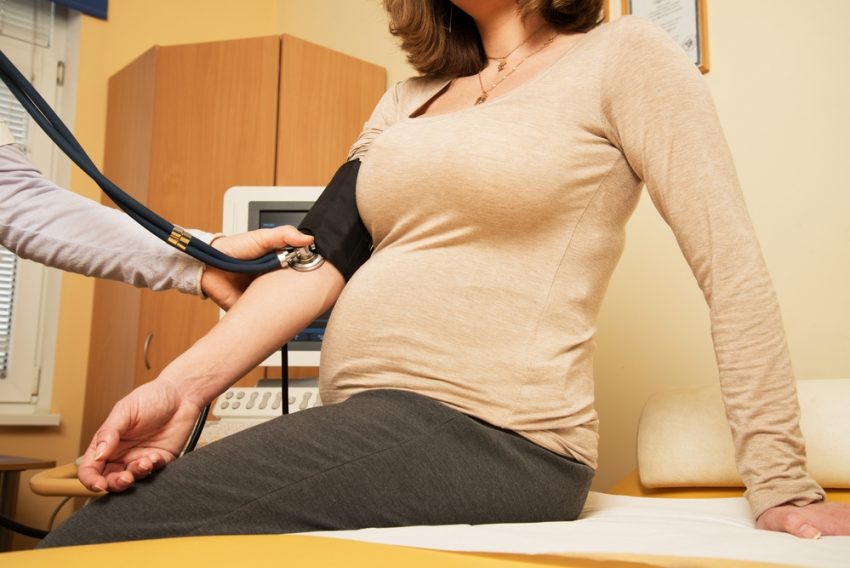There’s one thing all women know to expect from pregnancy: morning sickness. Often it’s a touch of squeamishness that alerts us to the possibility that we’re pregnant – and sends us racing out the door to buy a packet (or seven) or pregnancy tests to confirm. We’ve all seen that movie – you know, where the chick is suddenly vomiting at the *most* inopportune times and can’t stand the smell of her favourite food. She’s blissfully unaware of the cause, all the while you’re left screaming at the telly.
There are two things we’re told about morning sickness:
- It’s a cutesy little condition that’ll have you comically heaving into a pot plant trying to hide your pregnancy from friends
- It’ll magically disappear once you tick over the twelve week mark
But what if that’s not what *actually* happens to you? What if there’s nothing cute or comical about your illness? What if you don’t have to worry about hiding your pregnancy from friends because you’re locked in your bathroom too sick to leave the house? And what if the twelfth, thirteenth and fourteenth weeks roll around and the sickness has stayed put? Then, my friends, you might have hyperemesis gravidarum.
Comparing morning sickness and HG is like comparing a papercut to a bullet wound. Sure, both are things that happen to your body and cause you distress. But the similarities end there. They are part of the same family but more likely distantly related cousins who only catch up at Christmas.
At HGA we like to look at pregnancy sickness as a spectrum of severity. On one end you have morning sickness, which is very mild, doesn’t interfere with your daily life too much and subsides after the first trimester. In the middle, you’ll find nausea and vomiting in pregnancy (NVP) which is more intense than morning sickness, can last beyond the first trimester and will somewhat impact your ability to function normally. And at the other end you have HG, the most severe of the pregnancy sicknesses, which affects every facet of your life, lasts well beyond the first trimester (often until delivery) and makes it almost impossible to function normally.
For most women, morning sickness barely rates a mention in conversations with friends, family or doctors. It might linger in the background, making meal times, waking up for work or getting to sleep a bit more difficult than usual. But it’s easily managed and doesn’t take up much brain space. The difference with NVP and HG is that you’re so sick that your symptoms completely consume you. It will become all you can think about and it will quickly become impossible to continue living your life as normal.
If you wondering whether you might have HG chances are you probably do – or at least NVP. If you’re sick enough that you’re questioning it then it’s probably time to seek help to get things under control. If you’re just not sure, try the following:
- Keep an eye on the way you feel across a twenty-four hour period. Are there times when your sickness is worse, or when your symptoms ease off a little? If you’re sick more often than not, over the course of the day, it’s time to talk to someone. Sick doesn’t just mean actively vomiting – intractable nausea is enough to seek help
- Take a look at what kind of impact the sickness is having on your daily life. Are you too sick to go to work or out with friends? Are you spending more time in the bathroom or bed than anywhere else? One main difference between morning sickness and HG is how each affects your ability to function normally. If you find yourself cancelling plans, calling in sick or bed bound then get some help
- If you feel up to it, keep a log of your sickness and what you’re able to eat/drink. Track it in your phone or on a bit of paper, and note the times you vomit, when you eat or drink and how much you keep down. Not only will this help you keep on top of things, it will allow a doctor or ED triage to quantify the severity of your sickness
We are conditioned to expect sickness during early pregnancy, and for a lot of women it will be a welcome development that doesn’t warrant much fanfare. But, for those women suffering from NVP or HG it’s a much more serious situation. There’s no need to suffer in silence – you are entitled to care, support and relief from your symptoms. Please remember to speak up as much as you can, mention each and every symptom to your care provider, and seek support.
You may also like to read:









